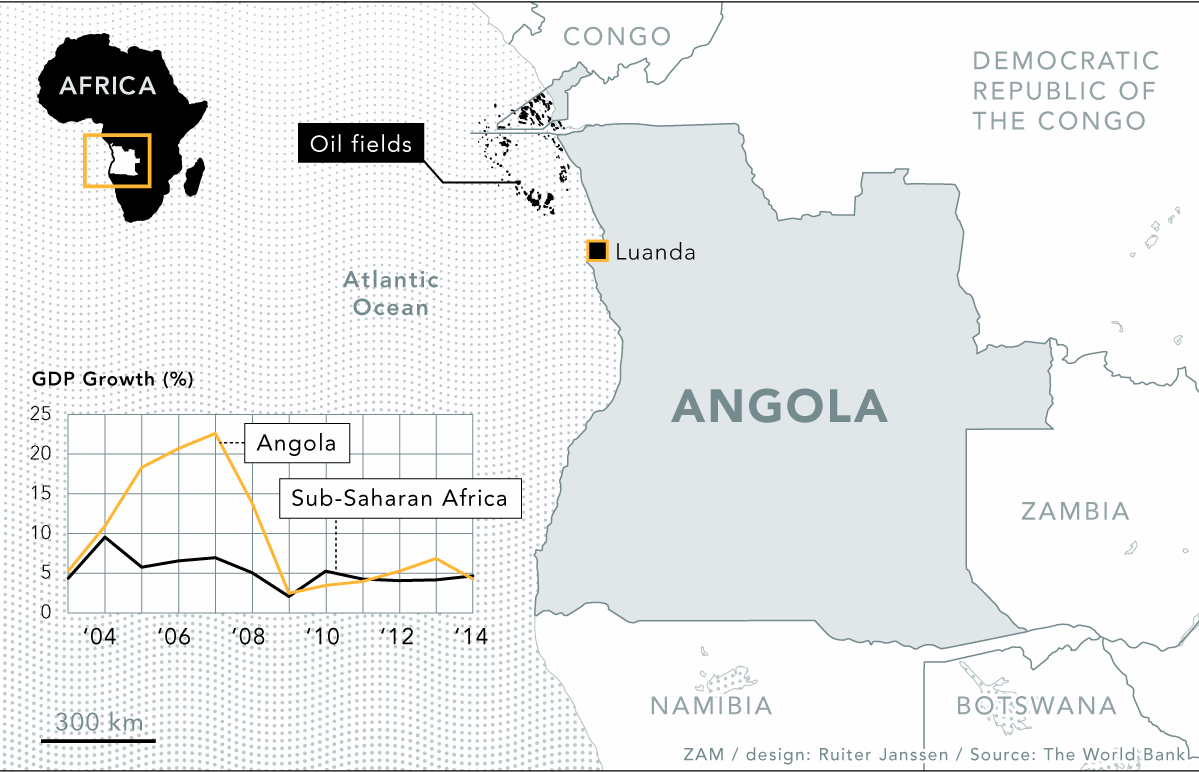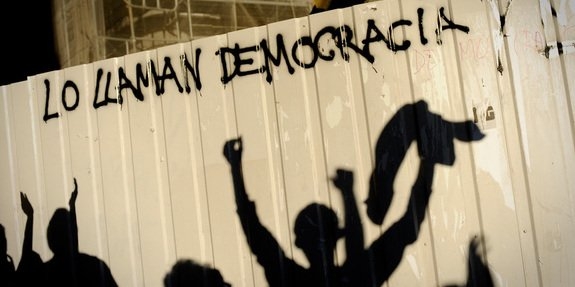With no more oil money coming in, Angola’s rulers try to counter a winter of discontent by force
For years, Angola’s elite rested comfortably on oil money. Even if it was an authoritarian one-party-state, protests were kept at bay as long as enough people saw dollars raining from the skies. But a winter of discontent is gripping the country. With oil prices down and coffers empty, social protest is visibly growing. The government, so far, has only responded with more repression.

It was on Independence Square, Luanda, where, forty years ago, Angola was proclaimed a sovereign nation, free of its Portuguese colonizers. For decades, here, under the shadow of the statue of founding father Agostinho Neto, unitary thinking was glorified and the concept of a multiparty system deemed an ‘historical impossibility.’ But today it is the scene of protests. Dark clouds hang over Neto’s legacy and winds of change are blowing at the MPLA government of José Eduardo dos Santos.
Movimento Revolucionário
Every week, Evaristo Luemba and fellow members of a new social movement calling itself ‘Movimento Revolucionario,’ gather here to protest the recent arrest and jailing of fifteen young activists who stand accused of a attempting a ‘coup’ against the government. Luemba and his companions laugh when asked what they think of Interior Minister Ângelo Veiga ‘s recent statement that "there are no political prisoners in Angola.” "If you are accused of a coup, doesn’t that make you a political prisoner?”
According to Angolan attorney general João Maria de Sousa, the fifteen youths were detained for allegedly ‘preparing acts of collective disobedience to overthrow the government and unseat president Dos Santos.’ These acts, as far as is known, consisted of the activists’ group readings and discussions of Gene Sharp’s book From Dictatorship to Democracy: A Conceptual Framework for Liberation, the blurb of which describes it as “a blueprint for nonviolent resistance to repressive regimes.”
The memory of ‘May 1977’ is back
The ‘coup’ accusation has revived the memory of an earlier such –way more murderous- accusation, made in 1977, only two years after the MPLA came to power in the country. The regime’s then response to an alleged ‘coup plot’ was a large-scale purge that lasted two years. Estimates of the numbers (many of them young people) jailed, tortured and killed in this crackdown run from 12 000 to 80 000. In the aftermath, a culture of political debate in the erstwhile liberation movement MPLA was suffocated and Angolans, for decades to come, were effectively discouraged from any involvement in ‘politics.’
But the memory of ‘May 1977’ is back. Activists have organised marches to commemorate the slaughter; recently arrested –or even disappeared- activists are mentioned in one breath with the victims from those days. The recent case of the fifteen coup accused has again seen the drawing of many parallels.
Compared to what happened in 1977, however, Luemba, his companions and many others in Angola can’t help laughing at the farcical way the state is behaving now. “If May 1977 was a tragedy, what happens now is a comedy,” quips anthropologist Antonio Tomas, one of Angola’s most prestigious political analysts. "Now youngsters are arrested for reading a book on peaceful demonstrations. What can you do but laugh?”
Mao’s bright sun
It is becoming difficult for the MPLA to weather this latest storm, even if some propagandists in the regime, true to Mao’s tenet, continue to see a ‘bright sun’ behind the clouds. To all who are not blinded by such optimistic visions, however, the state of the Angolan regime is weak. With oil prices down, the country’s years of ‘awash with cash’ drunkenness are over. The system is crumbling; state coffers are empty; the powerful are plagued by fear and their nervousness increases by the day.
This very nervousness could still lead to disasters, though, especially when police commanders declare that they are ‘combat ready’ to suppress any anti-government demonstration and various MPLA leaders have made statements to the effect that ‘not an inch of our country’ should be ‘given away’ to those who think differently. In parliament, the ruling party has forbidden live broadcast of its sessions; the opposition –and even MPLA members- are increasingly bugged by the secret service and the air is heavy with hostility. "The government's behaviour reveals that it is not prepared to live in a democratic environment where people can express their ideas. The MPLA has turned the constitution upside down,” says veteran journalist Graça Campos. The extreme responses worry even if MPLA-connected economist Galvão Branco. “We are responding with nuclear power to arrows,” he says, shaking his head.
Some MPLA statements say that ‘not an inch of our country’ should be given away
Nevertheless, very slowly, Angolan citizens are beginning to lose their fear. Once idolized by many as ‘the architect of peace’, the President’s popularity ratings are crashing and he is even caricatured for his nowadays rather rotund figure. People also increasingly talk of the wealth he, his family and close allies have accumulated: his daughter Isabel is Africa’s wealthiest woman. It is the schism between the rich elite and the ordinary citizens that Jacques dos Santos, writer and former MPLA parliamentarian, believes to be the driving force of todays’ social protest. “We see now the consequences of the poor distribution of wealth and the rampant corruption, and of the way these have affected the governance of the country."
The Cuban exodus threat
“This system is dominated by panic and haunted by ghosts,” is the way medical student Filipe Araújo puts it. Remarkably, some of these ghosts, particularly the ones worrying him, are Cuban. Araujo’s medical faculty, like many other medical structures in the country, have been staffed and supported by Angola’s long – standing Cuban allies. But the Cubans are now threatening to pull out as a result of a three-year-old unpaid and un-serviced debt of 300 million Euros, once contracted by the Angolan state for the purpose of hiring technicians, doctors and university professors from Cuba. It was only after the Cuban allies, who ensured the functioning of medical schools and other academic and technical institutions in the country, -including in the water and energy sectors-, threatened a mass exodus that Luanda finally blinked and made an emergency payment of 80 million Euros.
But it is not certain that the rest of the payments can be made, and so the threat of a complete breakdown of the national health system remains. "If all Cuban medical staff would depart from Angola, we will have chaos,” admits a senior official of the Ministry of Health.
The issue has again led to much murmuring in the streets of Luanda. “Our leaders have so much money for their luxury trifles, but they can’t pay Cuba?’
“The system is dominated by panic and haunted by ghosts”
Luxury trifles aside, the government really is short of cash. The oil sector now only brings in US$ 900 million monthly and thus can no longer support the heavy weight of a civil service that costs US$ 1,200 million a month. "The country has no money. But public officials, ministers and provincial governors, are not yet conscious of this reality," says a source at the National Bank of Angola. A colleague at the country’s largest bank, the BPC, whose main shareholder is the state-, confirms that his institution “does not have the money to satisfy its customers.”
Empty shelves
As a result, citizens are once again hiding their money at home, rather than depositing it in banks. Supermarket shelves, meanwhile, are emptying fast and the stock that remains gets more expensive by the day. Police now also daily carry out raids on stores whose owners are accused of ‘hoarding’ and ‘speculating.’ "Given the gravity of this situation, we will close many shops,” says Neves Abreu, officer of the economic police attached to the Ministry of Commerce.
The consequences of corruption, once cloaked and hidden under ever new wads of cash, are now also laid bare. Bad loans, made by ‘loyal’ banks to influential political allies, can no longer be sustained and result in painful losses. Meanwhile, those who have influence over the ‘parallel’ market are still able to transfer their dollars abroad –and do so, at a rate of millions every week. Payments of large sums of money to ‘invisible’ contractors abroad have reached astronomical heights. And “assets in the hands of Chinese and Lebanese investors are being liquidated on the black market, rather than by (expensive and taxed) regulated bank transfer,” says real estate manager Fernando Mauricio.
“The only way out is to close the windows of influence peddling, collusion and cronyism”
Pressure cooker
Government restrictions on money transfers abroad are, however, rigidly applied to those citizens and foreign residents who are unable to juggle the system. Foreigners can no longer send any money back to their countries. Families cannot wire transfer school fees to their children who are studying abroad. Proper suppliers of goods abroad cannot be paid and the lack of cash in the country is putting oil companies under even more pressure. Economist Alves da Rocha believes that the only way out of the nightmare is to “close all the windows of influence peddling, collusion and cronyism through which public funds disappear. That, and the application of a progressive tax on wealth".
President dos Santos has recently authorized the governor of the National Bank of Angola, José Pedro de Morais, to make ‘emergency use’ of foreign exchange reserves to respond to “situations that may install chaos in the country.” But the pressure cooker, meanwhile, continues to boil and even MPLA leaders admit being afraid of imminent explosion. “In this situation, social tensions will only become worse,” says one of them, speaking on condition of anonymity. Others, however, still seem only to see Chairman Mao’s ‘bright sun’, in the midst of a terrible storm.
Gustavo Costa is a veteran investigative journalist in Angola


